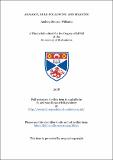Files in this item
Analogy, rule-following and meaning
Item metadata
| dc.contributor.advisor | Glick, Ephraim | |
| dc.contributor.advisor | Greenough, Patrick | |
| dc.contributor.author | Williams, Andrew Simeon | |
| dc.coverage.spatial | [5], 107 p. | en_US |
| dc.date.accessioned | 2019-10-08T14:42:27Z | |
| dc.date.available | 2019-10-08T14:42:27Z | |
| dc.date.issued | 2018-06-28 | |
| dc.identifier.uri | https://hdl.handle.net/10023/18627 | |
| dc.description.abstract | In this thesis, I argue that meaning something by a linguistic expression should be thought to consist, not in following a rule, but in drawing an analogy. I argue that using a linguistic expression meaningfully involves analogically extrapolating from our past experience of that expression, by observing a similarity between the present instance (that which the expression is being applied to) and previous instances (our past experiences involving the use of that expression). This is in opposition to the classical account of meaning, according to which meaning something by a linguistic expression involves following a rule – a rule stating necessary and jointly sufficient conditions for the expression to apply. I argue that there is no one thing that all meaningful instances of many linguistic expressions have in common, such that its meaning could be captured in the form of a rule. I claim that the categories corresponding to our linguistic expressions (containing the objects that any given expression is true of), are defined not in terms of necessary and jointly sufficient conditions, but in terms of family resemblance relationships between particular instances, such that analogy plays an essential role in every meaningful application of a linguistic expression. I argue that metaphorical uses of linguistic expressions are clearly dependent on analogy, and that as we are unable to uphold a principled distinction between the literal and the metaphorical, that all meaningful uses of language should be thought to depend on analogy. I argue that conceiving of meaning as governed by analogy, rather than rules, helps to diffuse the rule-following paradox, laid out by Saul Kripke. I claim that the meaning of every linguistic expression is governed by analogy, including the word ‘rule’, such that there may be scope to speak of ‘rules’ of meaning, after all. | en_US |
| dc.language.iso | en | en_US |
| dc.publisher | University of St Andrews | |
| dc.title | Analogy, rule-following and meaning | en_US |
| dc.type | Thesis | en_US |
| dc.type.qualificationlevel | Doctoral | en_US |
| dc.type.qualificationname | MPhil Master of Philosophy | en_US |
| dc.publisher.institution | The University of St Andrews | en_US |
This item appears in the following Collection(s)
Items in the St Andrews Research Repository are protected by copyright, with all rights reserved, unless otherwise indicated.

